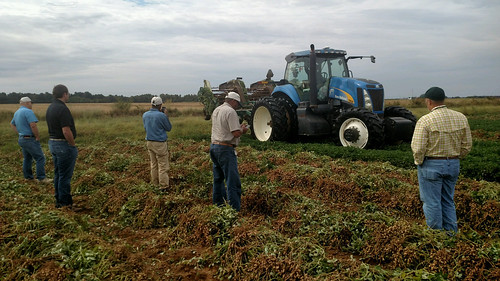YEAREND: Peanuts top 20K acres in Arkansas for 3rd straight year
Dec. 14, 2018
By Mary Hightower
U of A System Division of Agriculture
Fast facts:
- Rain, freezing weather slow harvest
- Overall, peanut grades are good
(380 words)
(Newsrooms: with 2018 harvest photo here: https://flic.kr/p/2cjrx9h and file art at https://flic.kr/p/dsLYrM )
Download Word version
LITTLE ROCK – Arkansas farmers planted more than 20,000 acres of peanuts for the third
straight year, but this year were enduring a harvest that dragged into December.
“Arkansas peanut farmers planted a little over 25,000 acres, which is the third consecutive year of over 20,000 acres for the state,” said Travis Faske, extension plant pathologist who also serves as peanut agronomist for the University of Arkansas System Division of Agriculture.
According to the National Agricultural Statistics Service Crop Report for Dec. 2, peanuts were 78 percent harvested. In 2017, harvest had been completed.

“In May, the 2018 crop was planted within a narrow three-week window and conditions were ideal for peanut production, other than it was dry in June and July,” Faske said.
“Harvest was about 25 percent behind 2017, but yield estimates are good,” he said. “Early yield estimates range from 4,800 – 6,500 pounds per acre in fields that are relatively new in peanut production, and lower – 3,500-4,500 pounds per acre – in fields with a longer history of production.
“Overall, grades are good and should average in the mid-70s,” Faske said.
October, November and December provided plenty of rain and with “poor water drainage in some fields, a portion of some fields will not be harvested this season,” he said. “This year harvest seems to keep going on and on and on.”
The top peanut producing counties in Arkansas include Craighead, Mississippi, Lawrence and Randolph, all in the northeastern part of the state, and Lee in east-central Arkansas.
“Quality was pretty high in the beginning of harvest, but has dropped some, due to the growers not being able to get the peanuts out of the field,” said Mike Andrews, Randolph County extension staff chair for the Division of Agriculture. “We’d get a half-inch of rain, which would delay harvest for four to five days, then work a few days, then get another little rain event.”
Then the rain, and a little snow and some freezing temperatures, piled up on farmers during November and December.
“This has not been ideal by any means, but that’s the life of a peanut grower,” Andrews said. “Where growers can go in to get their beans and rice, peanut growers can’t go in when it’s wet.”
For more information about peanut production, contact your county extension office, or visit www.uaex.uada.edu.
About the Division of Agriculture
The University of Arkansas System Division of Agriculture’s mission is to strengthen agriculture, communities, and families by connecting trusted research to the adoption of best practices. Through the Agricultural Experiment Station and the Cooperative Extension Service, the Division of Agriculture conducts research and extension work within the nation’s historic land grant education system.
The Division of Agriculture is one of 20 entities within the University of Arkansas System. It has offices in all 75 counties in Arkansas and faculty on five system campuses.
Pursuant to 7 CFR § 15.3, the University of Arkansas System Division of Agriculture offers all its Extension and Research programs and services (including employment) without regard to race, color, sex, national origin, religion, age, disability, marital or veteran status, genetic information, sexual preference, pregnancy or any other legally protected status, and is an equal opportunity institution.
# # #
By Mary Hightower
The Cooperative Extension Service
U of A System Division of Agriculture
Media Contact: Mary Hightower
Dir. of Communication Services
U of A Division of Agriculture
Cooperative Extension Service
(501) 671-2126
mhightower@uada.edu
Related Links